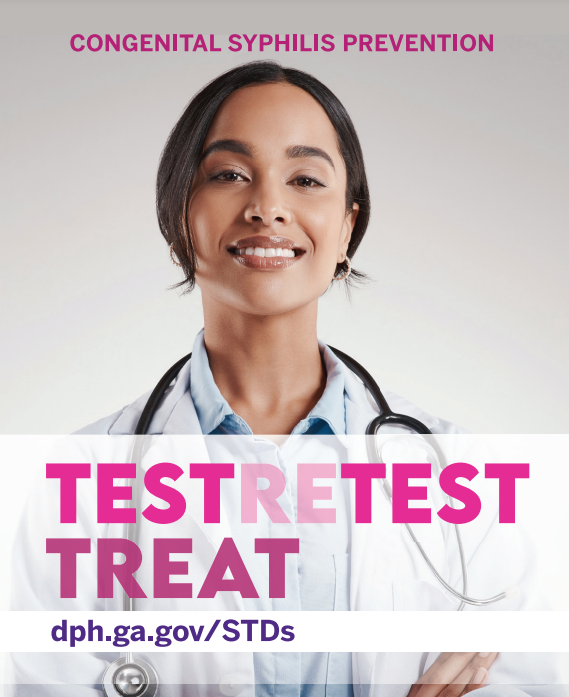
STD Prevention for Pregnant Women

STDs can complicate pregnancy and have severe consequences for a woman and her developing baby. If you are
pregnant, you can become infected with the same sexually transmitted diseases (STDs) as women who are not pregnant.
Pregnant women should ask their doctors about getting tested for STDs and, more specifically, testing for syphilis. In Georgia, over the last five years, there has been a rise in syphilis cases among women.
For more information, don't hesitate to contact your local health department. Providers can
Download
CS Palm Card
.
-
Should I Get Tested For an STDS?
Yes, all pregnant women in Georgia should be tested for syphilis at the first prenatal visit (the first time you see your doctor for health care during pregnancy) and again during the third trimester of pregnancy. This is mandated by state law.
Keep in mind that you can have syphilis and not know it. Many people with syphilis do not have any symptoms. Also, syphilis symptoms may be very mild or similar to signs of other health problems. The only way to know for sure if you have syphilis is to get tested.
-
I’m Pregnant. Can I Get an STD?
Yes, you can. Women who are pregnant can become infected with the same STDs as women who are not pregnant. Pregnancy does not provide women or their babies any additional protection against STDs. Many STDs are ‘silent,’ or have no symptoms, so you may not know if you are infected. If you are pregnant, you should be tested for STDs, including HIV (the virus that causes AIDS), as a part of your medical care during pregnancy.
-
How Can STDs Affect Me and My Unborn Baby?
STDs can complicate your pregnancy and may have serious effects on both you and your developing baby. Some of these problems may be seen at birth; others may not be discovered until months or years later. In addition, it is well known that infection with an STD can make it easier for a person to get infected with HIV. Most of these problems can be prevented if you receive regular medical care during pregnancy. This includes tests for STDs starting early in pregnancy and repeated close to delivery, as needed.
Testing and treating pregnant women for STDs is a vital way to prevent serious health complications to both mother and baby that may otherwise happen with infection. The sooner you begin receiving medical care during pregnancy, the better the health outcomes will be for you and your unborn baby. The Centers for Disease Control and Prevention’s 2021 STD Treatment Guidelines recommend screening pregnant women for STDs. The CDC screening recommendations that your health care provider should follow are incorporated into the table on the STDs during Pregnancy – Detailed CDC Fact Sheet.
-
Can I Get Treated For an STD While I’m Pregnant?
It depends. STDs, such as chlamydia, gonorrhea, syphilis, trichomoniasis and BV can all be treated and cured with antibiotics that are safe to take during pregnancy. STDs that are caused by viruses, like genital herpes, hepatitis B, or HIV cannot be cured. However, in some cases these infections can be treated with antiviral medications or other preventive measures to reduce the risk of passing the infection to your baby. If you are pregnant or considering pregnancy, you should be tested so you can take steps to protect yourself and your baby.
-
How Can I Reduce My Risk of Getting an STD While Pregnant?
The only way to avoid STDs is to not have vaginal, anal, or oral sex.
If you are sexually active, you can do the following things to lower your chances of getting chlamydia:
Being in a long-term mutually monogamous relationship with a partner who has been tested and has negative STD test results;
Using latex condoms the right way every time you have sex. -
How Can STDs Affect Me After Pregnancy
Chlamydia and gonorrhea are important preventable causes of pelvic inflammatory disease (PID) and infertility. Untreated, about 10-15% of women with chlamydia will develop PID. Chlamydia can also cause fallopian tube infection without any symptoms. PID and “silent” infection in the upper genital tract may cause permanent damage to the fallopian tubes, uterus, and surrounding tissues, leading to infertility. CDC recommends annual chlamydia and gonorrhea screening of all sexually active women younger than 25 years and older women with risk factors such as new or multiple sex partners or a sex partner who has a sexually transmitted infection.
Page Last Updated 02/18/2026